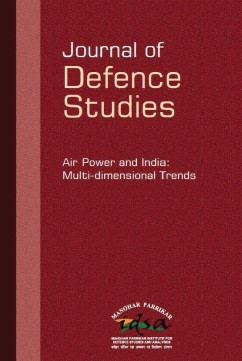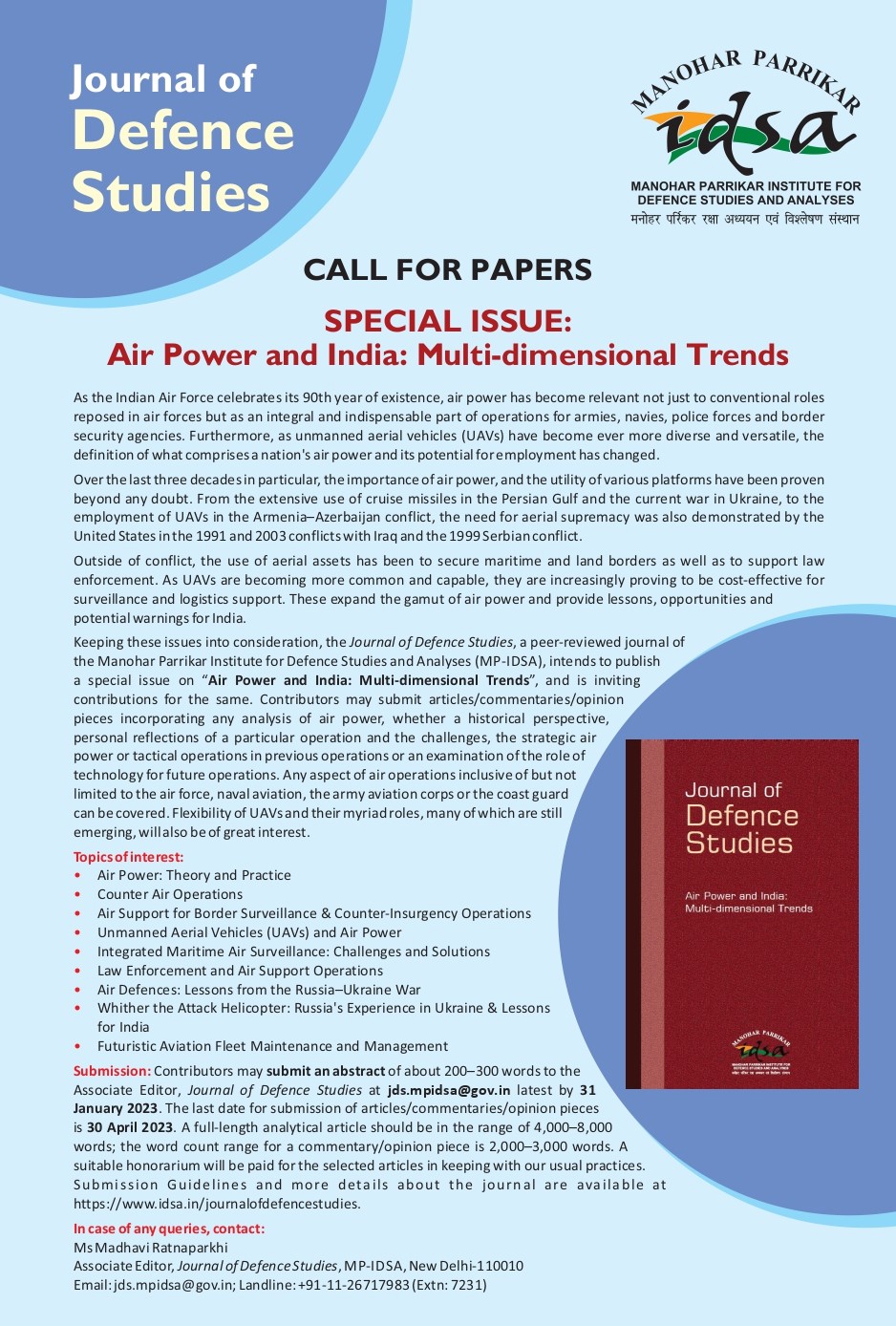Call for Papers
CALL FOR PAPERS

Journal of Defence Studies
Special Issue: AIR POWER AND INDIA: MULTI-DIMENSIONAL TRENDS
Deadline for Submission of Abstracts: 15 February 2023
Deadline for manuscript submission: 30 April 2023
Download Concept Note [PDF]
 As the Indian Air Force celebrates its 90th year of existence, air power has become relevant not just to conventional roles reposed in air forces but as an integral and indispensable part of operations for armies, navies, police forces and border security agencies. Furthermore, as unmanned aerial vehicles (UAVs) have become ever more diverse and versatile, the definition of what comprises a nation’s air power and its potential for employment has changed.
As the Indian Air Force celebrates its 90th year of existence, air power has become relevant not just to conventional roles reposed in air forces but as an integral and indispensable part of operations for armies, navies, police forces and border security agencies. Furthermore, as unmanned aerial vehicles (UAVs) have become ever more diverse and versatile, the definition of what comprises a nation’s air power and its potential for employment has changed.
Over the last three decades in particular, the importance of air power, and the utility of various platforms have been proven beyond any doubt. From the extensive use of cruise missiles in the Persian Gulf and the current war in Ukraine, to the employment of UAVs in the Armenia–Azerbaijan conflict, the need for aerial supremacy was also demonstrated by the United States in the 1991 and 2003 conflicts with Iraq and the 1999 Serbian conflict.
Outside of conflict, the use of aerial assets has been to secure maritime and land borders as well as to support law enforcement. As UAVs are becoming more common and capable, they are increasingly proving to be cost-effective for surveillance and logistics support. These expand the gamut of air power and provide lessons, opportunities and potential warnings for India.
Keeping these issues into consideration, the Journal of Defence Studies, a peer-reviewed journal of the Manohar Parrikar Institute for Defence Studies and Analyses (MP-IDSA), intends to publish a special issue on “Air Power and India: Multi-dimensional Trends”, and is inviting contributions for the same. Contributors may submit articles/commentaries/opinion pieces incorporating any analysis of air power, whether a historical perspective, personal reflections of a particular operation and the challenges, the strategic air power or tactical operations in previous operations or an examination of the role of technology for future operations. Any aspect of air operations inclusive of but not limited to the air force, naval aviation, the army aviation corps or the coast guard can be covered. Flexibility of UAVs and their myriad roles, many of which are still emerging, will also be of great interest.
Topics of interest:
- Air Power: Theory and Practice
- Counter Air Operations
- Air Support for Border Surveillance & Counter-Insurgency Operations
- Unmanned Aerial Vehicles (UAVs) and Air Power
- Integrated Maritime Air Surveillance: Challenges and Solutions
- Law Enforcement and Air Support Operations
- Air Defences: Lessons from the Russia–Ukraine War
- Whither the Attack Helicopter: Russia’s Experience in Ukraine & Lessons for India
- Futuristic Aviation Fleet Maintenance and Management
|
Submission: Contributors may submit an abstract of about 200–300 words to the Associate Editor, Journal of Defence Studies at jds.mpidsa@gov.in latest by 15 February 2023. The deadline for submission of articles/commentaries/opinion pieces is 30 April 2023. A full-length analytical article should be in the range of 4,000–8,000 words; the word count range for a commentary/opinion piece is 2,000–3,000 words. The contributions will be double-blind peer-reviewed following the journal’s standard review process, and an honorarium will be paid for the selected articles in keeping with our usual practices. Submission Guidelines and more details about the journal are available at https://www.idsa.in/journalofdefencestudies. In case of any queries, contact: Ms Madhavi Ratnaparkhi Associate Editor, Journal of Defence Studies, MP-IDSA New Delhi-110010 Email: jds.mpidsa@gov.in; Landline: +91-11-26717983 (Extn: 7231) |
Guidelines for Contributors
(JDS Special Issue: AIR POWER AND INDIA: MULTI-DIMENSIONAL TRENDS)
Submission of Abstracts (200–300 words) latest by 15 February 2023.
Manuscript submission: Articles ranging between 4,000 and 8,000 words and commentaries/perspective pieces of about 2,000–3,000 words may be sent to the Associate Editor, Journal of Defence Studies at jds.mpidsa@gov.in latest by 30 April 2023.
Format
- Manuscripts need to be submitted in MS Word format (2003/2007/newer versions). The text (including notes) should be typed in Times New Roman, 12 pt with 1.5 line spacing and standard margins.
- An abstract of about 100–150 words and 5–6 keywords should be provided in the articles.
- British spellings with ‘s’ variant should be used, i.e., ‘analyse’, ‘organise’, ‘specialisation’, ‘labour’, etc.
- Single quotation marks should be used consistently and use double quotation marks for indicating quoted matter within quotations.
- Tables/Figures/Maps/Images should be numbered sequentially, with appropriate captions, source details and call-outs in the text.
References
All citations/references to others’ works should be clearly mentioned in the notes (footnotes), with a corresponding note cue in the text. The format is mentioned below.
Book: Liang Zhang, Andrew J. Nathan, Perry Link and Orville Schell, The Tiananmen Papers: The Chinese Leadership’s Decision to Use Force Against their Own People—In Their Own Words, Public Affairs, New York, 2001.
Edited Volume: Ashley Tellis, Mercy Kuo and Andrew Marble (eds), Strategic Asia 2008–09: Challenges and Choices, National Bureau of Asian Research, Seattle, 2008.
Chapter in an Edited Volume: T. Jayaraman, Tejal Kanitkar and Mario D’Souza, ‘Equity and Burden Sharing in Emission Scenarios: A Carbon Budget’, in Navroz Dubash (ed.), Handbook of Climate Change and India: Development, Politics and Governance, Oxford University Press, New Delhi, 2012, pp. 140–46.
Journal Article: Arthur A. Stein, ‘Coordination and Collaboration: Regimes in an Anarchic World’, International Organization, Vol. 36, No. 2, 1982, pp. 99–114.
Web Reference: Vladimir Radyuhin, ‘INS Vikramaditya Begins Sea Trials’, The Hindu, 8 June 2012, available at http://www.thehindu.com/news/international/article3503982.ece, accessed on 8 June 2012.



